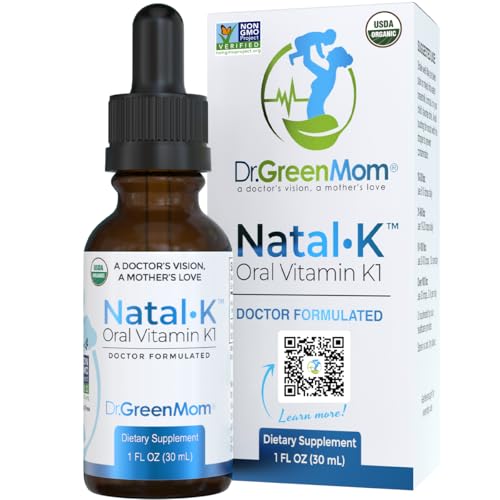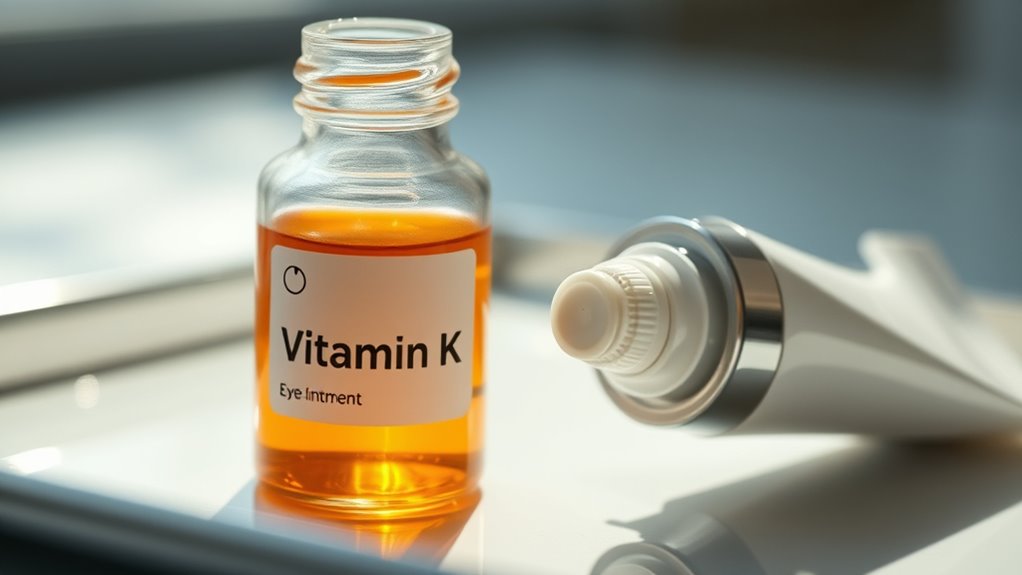Vitamin K ointment is given to newborns to help their blood clot properly and prevent serious bleeding, especially in the eyes and other tissues. It’s a quick, simple way to support healthy blood vessel function early on. This prevents conditions like vitamin K deficiency bleeding, which can cause dangerous hemorrhages and affect eye development. To discover how this essential nutrient plays a role in eye health and safety, keep exploring the details.
Key Takeaways
- Vitamin K is vital for blood clotting, preventing bleeding in the eyes, especially in newborns.
- It is administered as ointment or injection shortly after birth to prevent vitamin K deficiency bleeding (VKDB).
- Vitamin K ointment helps strengthen eye blood vessels and reduces the risk of hemorrhages affecting vision.
- Ongoing research explores its potential for treating or preventing eye conditions involving abnormal blood vessel growth.
- Medical guidance is recommended before using vitamin K ointment for eye health beyond neonatal prophylaxis.

Vitamin K, a vital nutrient known for its role in blood clotting, is increasingly being explored for its potential benefits in eye health, especially when applied through ointments. While most people associate vitamin K with preventing bleeding disorders, recent studies suggest that it might also play a role in maintaining healthy blood vessels in the eyes. This connection is particularly important for newborn health, as vitamin K deficiency can lead to bleeding issues that may affect the eyes and overall development. When administered as an ointment, vitamin K may help reinforce blood vessel integrity, reducing the risk of bleeding within the eye tissues. This can be especially beneficial in premature infants or babies with a higher risk of hemorrhages, ensuring their eyes develop properly without complications caused by bleeding.
In newborns, vitamin K ointments are often given shortly after birth to prevent vitamin K deficiency bleeding (VKDB). This condition can cause severe bleeding in various parts of the body, including the eyes, which is why securing adequate vitamin K levels early on is critical. Administering vitamin K through ointments or injections helps establish a baseline level that supports normal blood clotting processes. In eye health, this means fewer chances of hemorrhages that could impair vision or cause long-term damage. For parents and caregivers, applying vitamin K ointment is a simple and effective way to safeguard their child’s health, ensuring that bleeding prevention measures are in place from the very beginning.
Beyond newborns, there’s emerging interest in whether vitamin K ointments could benefit people with eye conditions linked to abnormal blood vessel growth or bleeding. While research is still ongoing, some experts believe that topical vitamin K might support the health of tiny blood vessels in the eyes, potentially reducing the risk of hemorrhages that could worsen conditions like diabetic retinopathy or age-related macular degeneration. Additionally, understanding the blood vessel health in the eye is crucial for developing targeted treatments. However, these applications are still under investigation, and it’s essential to follow medical advice before using vitamin K ointments for eye health outside neonatal care.

Dr. Green Mom Natal K Oral Vitamin K1 Drops for Newborns | Organic Phytonadione in MCT Oil | Natural VIT K for Babies to Support Blood Clotting
A Trusted Oral Vitamin K Supplement Suitable for Infants: Dr. Green Mom Natal K provides 500 mcg of…
As an affiliate, we earn on qualifying purchases.
As an affiliate, we earn on qualifying purchases.
Frequently Asked Questions
Can Vitamin K Eye Ointment Prevent Future Eye Infections?
Vitamin K eye ointment isn’t typically used for eye infection prevention. Its primary benefits involve blood clotting and preventing bleeding, especially in newborns. While vitamin K plays a crucial role in overall health, it doesn’t directly prevent eye infections. For eye infection prevention, good hygiene and proper care are essential. Using vitamin K ointment regularly won’t stop infections, but it can support your body’s ability to heal and function properly.
Are There Any Side Effects From Using Vitamin K Eye Ointment?
You might experience some side effects from using vitamin K eye ointment, such as allergic reactions or eye irritation. These are usually mild but can include redness, swelling, or itching around your eyes. If you notice any severe symptoms or if the irritation persists, it’s important to contact your healthcare provider promptly. Always follow your doctor’s instructions and report any unusual reactions to guarantee safe use.
How Long Does It Take for Vitamin K Eye Ointment to Work?
You’ll likely see the effects of vitamin K eye ointment within a few days to a week, depending on the condition’s severity. The timeline effectiveness varies based on how regularly you apply the ointment, so sticking to the recommended application frequency is key. Consistent use helps make certain the treatment works as intended, and you should start noticing improvement as your body responds to the medication.
Is Vitamin K Eye Ointment Safe for Newborns and Infants?
Think of vitamin K eye ointment as a gentle shield for your little one’s eyes. It’s generally safe for newborns and infants when used as directed, but safety concerns remain if dosage guidelines aren’t followed. Always consult your pediatrician to ensure proper use, and watch for any unusual reactions. Proper application and professional guidance help keep your baby safe, like a guardian angel watching over their delicate eyes.
Can Vitamin K Eye Ointment Be Used Alongside Other Eye Medications?
Yes, you can use vitamin K eye ointment alongside other eye medications, but you should be cautious about drug interactions. Always inform your healthcare provider about all medications your baby receives. Follow proper application techniques to guarantee each medication is effective and doesn’t interfere with the other. It’s important to wait the recommended time between applications and avoid contamination to protect your baby’s eyes from potential issues.

Babyface Extra-Strength Vitamin K Cream – Dark Circles, Bruise Healing, Redness Relief, and Even Skin Tone (1.3 oz)
Extra-Strength Healing Formula: Enriched with Vitamin K3 to accelerate recovery from bruising, post-surgery redness, and purple blotches, promoting…
As an affiliate, we earn on qualifying purchases.
As an affiliate, we earn on qualifying purchases.
Conclusion
So, next time you’re handed eye ointment with a dash of vitamin K, remember—it’s not just for your vision but also for preventing tiny, unseen battles inside your eyes. Ironically, what seems like a simple drop can hold the power to shield you from something as subtle as bleeding. It’s a small reminder that even the tiniest vitamin can make a big difference—proof that sometimes, the smallest things truly have the greatest impact.
neonatal Vitamin K topical treatment
As an affiliate, we earn on qualifying purchases.
As an affiliate, we earn on qualifying purchases.

Era Organics Healing Ointment for Babies – USDA Certified Organic Natural Moisturizer Gentle on Sensitive Skin Prone To Baby Eczema, Cradle Cap (Infant Seborrheic Dermatitis), Rashes, Hives and More
Clinically Tested & Mom-Approved: National Eczema Association Approved, Dermatologically Tested, and Pediatrician Recommended. This 100% USDA Organic baby…
As an affiliate, we earn on qualifying purchases.
As an affiliate, we earn on qualifying purchases.









